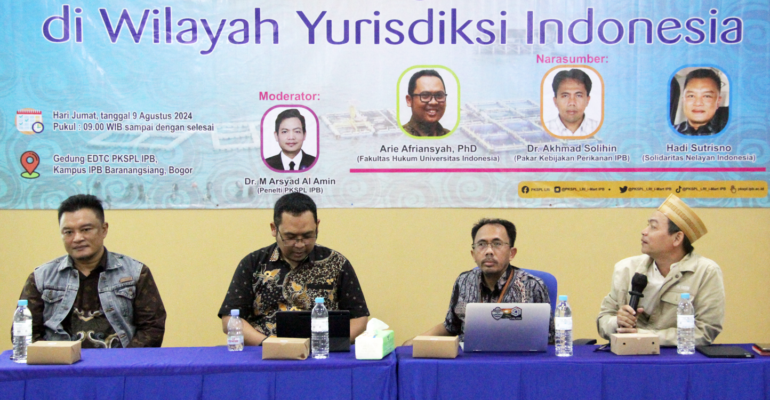Holds Public Discussion, PKSPL IPB University Discusses the Direction of Law Enforcement in the Indonesian Jurisdictional Area

The Centre for Coastal and Marine Resources Studies (PKSPL) of IPB University held a Public Discussion in the Executive Development Training Center (EDTC) Room of PKSPL, IPB Baranangsiang Campus (9/8). The event was attended by student organisations (ormawa), lecturers and researchers of IPB University, as well as community service organisations.
Dr Akhmad Solihin, Vice Chief of the Socio-Economic and Institutional Division of PKSPL IPB University, said, ‘The jurisdictional area which includes additional zones, exclusive economic zones and continental shelves only applies to the sovereign rights of a coastal state.’
“With the difference in the legal regime of each zone according to the 1982 International Law of the Sea/UNCLOS, the parties involved in law enforcement are also certain institutions,” he continued.
However, one of IPB University’s lecturers, Dr Solihin, revealed that in its development the direction of law enforcement in the jurisdiction in Indonesia has changed.
“The issuance of Law (UU) No 16 of 2023 concerning the Indonesian Continental Shelf has changed the institutional order of law enforcement with the inclusion of the police as an investigating agency in the continental shelf jurisdiction,” he said.
“The authority of police investigation in the jurisdiction is then strengthened in the Draft Police Law that is being discussed in parliament. This will increase the conflict of interest in law enforcement,” said Dr Solihin.
Meanwhile, University of Indonesia Faculty of Law lecturer, Dr Arie Apriansyah, added that there are no institutional restrictions in law enforcement in jurisdictional areas. However, he said, there is no learning from countries that involve the police in law enforcement in the jurisdiction.
“From existing studies, the police in various countries generally exercise investigative authority in their national jurisdictions such as inland waters, archipelagic waters and territorial sea as far as 12 nautical miles,” he said.
Hadi Sutrisno from Solidaritas Nelayan Indonesia who came all the way from Pati Regency said that the increase of law enforcement agencies in Indonesia’s jurisdiction does not guarantee a sense of security for fishermen.
“The presence of law enforcement officers in the middle of the sea only creates a sense of anxiety among fishermen, because there are always checks that are always looking for flaws,” he said. (*/Rz) (IAAS/RUM)



